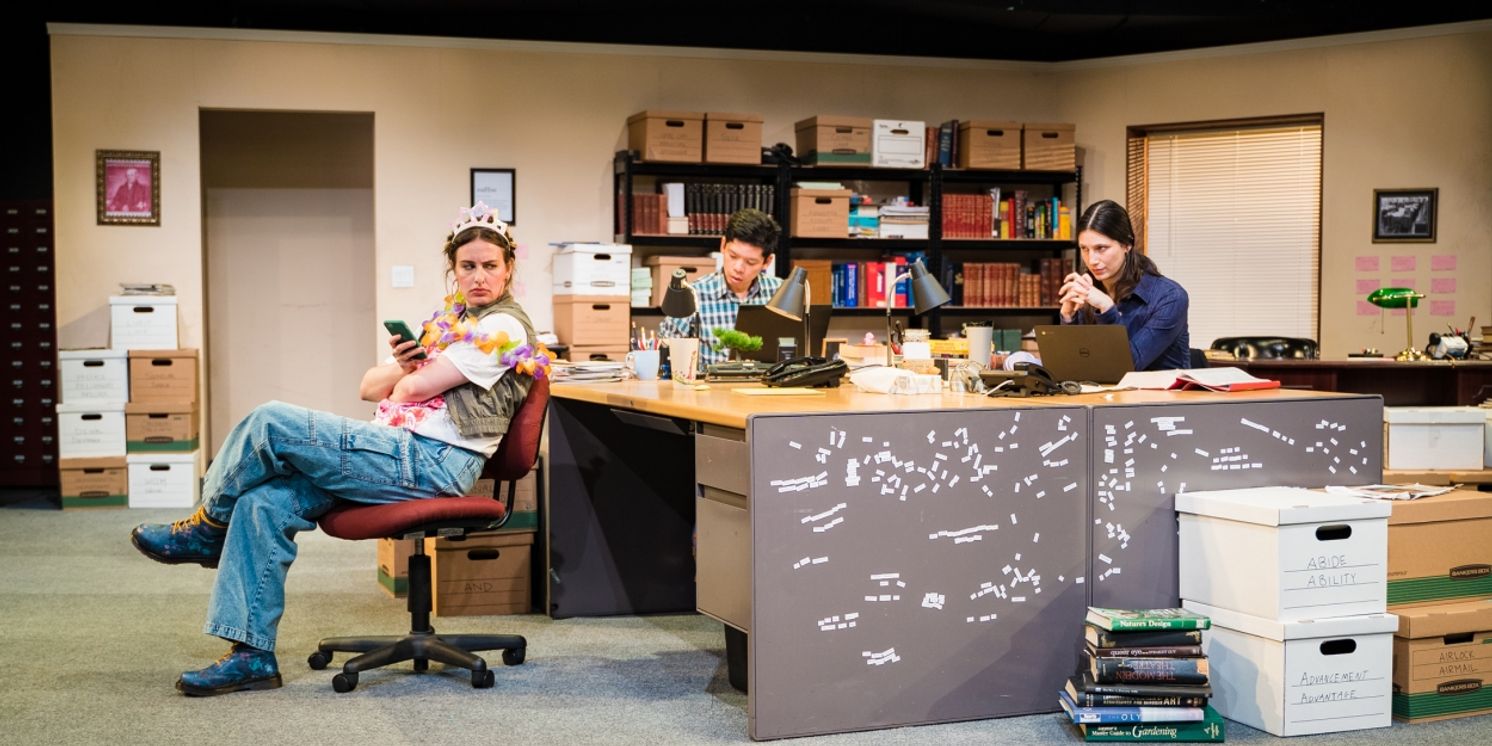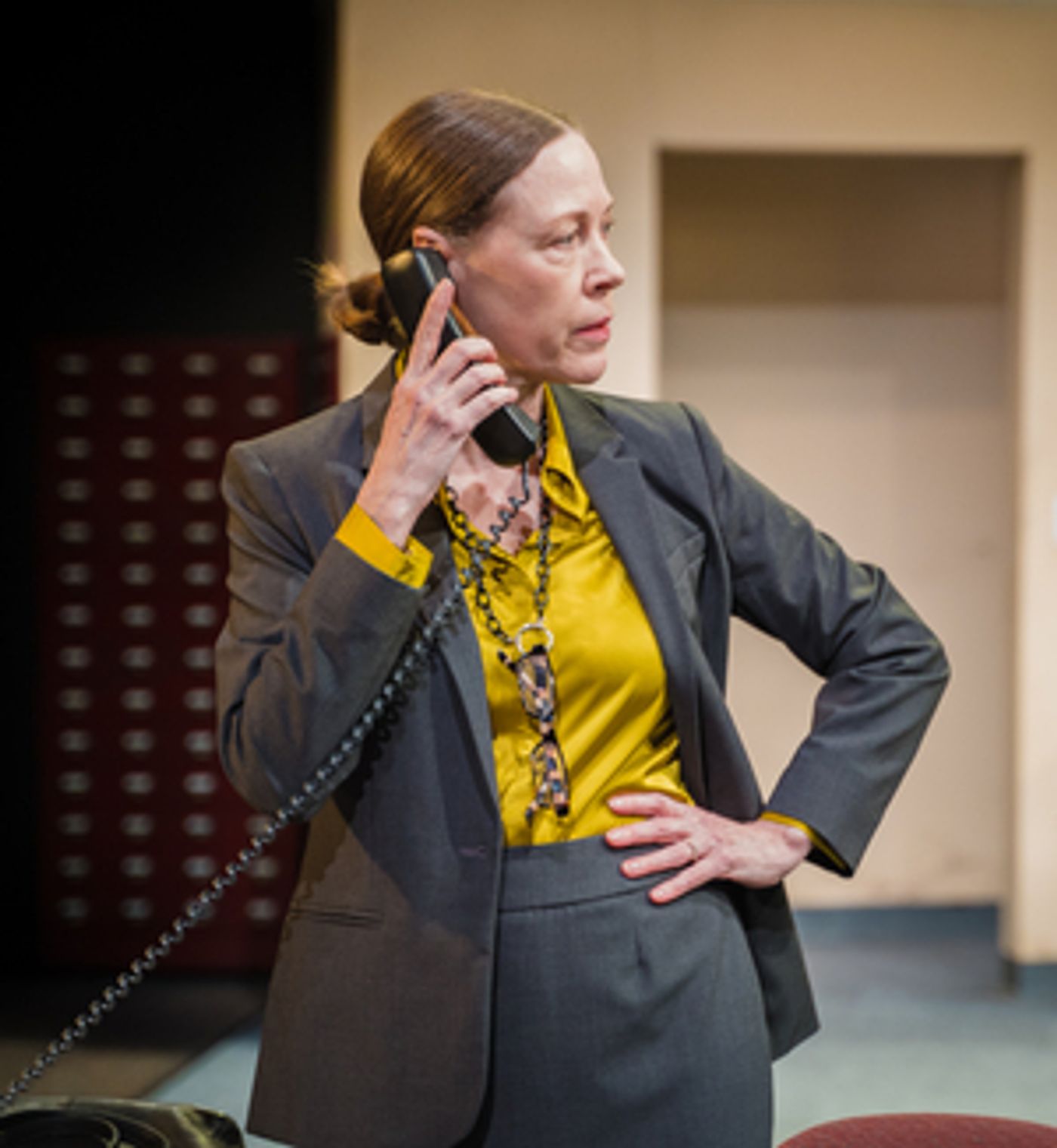Review: WEBSTER'S BITCH at Playhouse On Park
A smart and well-acted World Premiere: Don't miss this!


The provocative title of Webster’s Bitch, receiving an excellent production at Playhouse on Park, signals that the play very much intends to provoke. Jacqueline Bircher’s World Premiere was developed entirely at the Playhouse, so seeing it here not only proves that the theater is willing to take a chance on a new playwright but also that its leaders are working to bring in an audience open to challenges. Webster’s Bitch could be even more challenging and original, but as far as premieres go, the work hits many topical notes in a sharp and entertaining way and introduces us to a world we may know little to nothing about: the world of lexicography, or of keeping dictionaries correct and current.
The “Webster” of the title is indeed the revered tome that most of us carried to school and back, or that sat--large, heavy, and judgmental---on a special shelf in our homes. Webster’s Bitch takes place in an office of the dictionary’s Stamford, Connecticut location, and within moments we are made to understand that, as director, Vanessa Morosco puts it, “A lexicographer’s job is not to prescribe how we use language, but to describe how we use it.” (The emphasis is mine). As the action unfolds, we understand just how smart a setting Bircher has chosen, since offices are often sites of political strife, and the use of language, while it may always have been in a state of flux, is currently a battleground.
At the top of the show, two young employees, Gwen (an excellent Mia Wurgaft) and Nick (HanJie Chow, doing his best with an under-written role) are hard at work, against a deadline, updating words and meanings. Enter Gwen’s sister, Ellie, who—on her way to Nepal to help impoverished women—has stopped by for a margherita with Gwen before taking off for the airport. Ellie is a loud, extroverted, emotionally tone-deaf young woman, but her demands and interruptions are quickly topped by the news that the office’s Editor-in-Chief—off at a conference at Yale—has been recorded as saying, when he thought his mic was off, that his assistant director and Gwen and Nick’s direct supervisor, Joyce, is “his bitch.” The question of what action Gwen, Nick, and Joyce (the incomparable Veanne Cox) are to take in the face of this scandal comprises much of the plot, and these conversations and decisions reveal other conflicts that have long been simmering.
Despite Isabel Monk Cade’s all-out performance as Ellie, which many in the audience found hilarious, the character herself is the script’s weakest element. Ellie seems to have been written purely for comic relief, and her ambitious and altruistic trip feels completely improbable, given her child-like self-involvement. Perhaps Bircher could write a different play for this character (who could certainly fill one!) or revise her in this play so she is as fully involved in the issues as are the others.
Mia Wurgaft captures Gwen’s frustrations, but I’d like to know more about what’s behind Gwen’s desperate dedication to her career at this particular branch of Webster’s, when she obviously has skills that numerous companies would value. The reasons we hear are not especially original, and this hampers any actor assaying the role. However, Wurgaft is clearly a gifted performer, and she’s very strong, especially, in her big scene with Cox.
Veanne Cox, as Joyce, is reason enough to buy a ticket. With her slim upright form encased in a bright chartreuse blouse and gray pencil skirt, red hair scraped back into the smallest of pigtails, and a mask-like face, her Joyce is the epitome of grim control. But Cox can play personal anguish just as effectively. As the action unfolds, there is no question about where her suppressed hurt and rage come from, even aside from Frank’s most recent insult.
Frank himself enters somewhat late in the 100-minute run-time of the play, but Peter Simon Hilton’s Frank makes an impact, both actor and character walking a delicate line. On the one hand, Hilton nearly convinces us that Frank truly believes that an apology will appease Joyce and make his appalling comment, and its viral results, evaporate. On the other hand, this Frank has a trove of experience in using his apparent good nature to manipulate. Bircher cleverly keeps us up in the air about Frank’s true beliefs, and Hilton embodies her intention.
Director Vanessa Morosco has staged Webster’s Bitch beautifully, opening up the Playhouse’s small three-quarter playing space for entrances and exits, and grouping the desks to signify the relative power of the characters. Scenic and Lighting Designer, Johann Fitzpatrick, has cleverly lined the poles at upstage right and left with office drawers and created a space that is completely believable without fuss; this room is both arid and, as Gwen experiences it, comforting in its simplicity. Raven Ong’s costumes are spot-on, especially in her pairing of Joyce’s extremely conservative suit with that shiny chartreuse blouse: the clash creates instant mystery around a character who otherwise seems to wish to be invisible, at least as a woman.
Bircher has a terrific ear and is attuned to the rhythms and beats of a disturbing yet comedic office drama. She is also attuned to numerous issues plaguing the sexes, the language with which we talk about those issues, and the power struggles that are an unfortunate constant in our current culture. I wish for Webster’s Bitch a few revisions and a long and prosperous life; and I congratulate Playhouse on Park for encouraging new work and for presenting plays that refuse easy answers.
Webster’s Bitch continues at Playhouse on Park, 244 Park Road, West Hartford, Connecticut, through June 18. For further information, call the box office at: 860-523-5900 X 10 or visit: www.playhouseonpark.org.
Photo Credit: Meredith Longo
Reader Reviews
Videos

